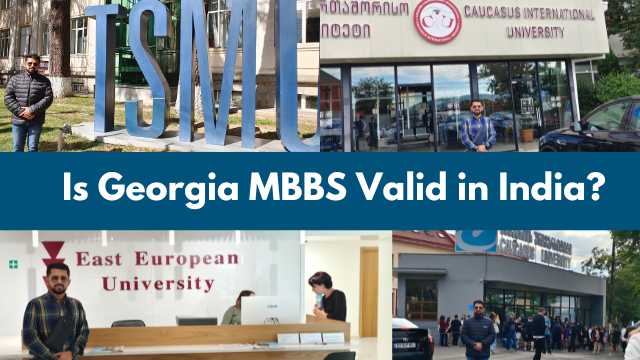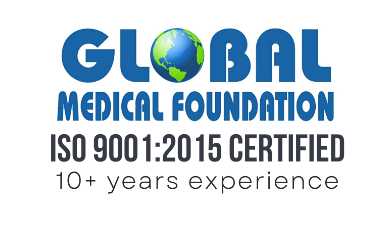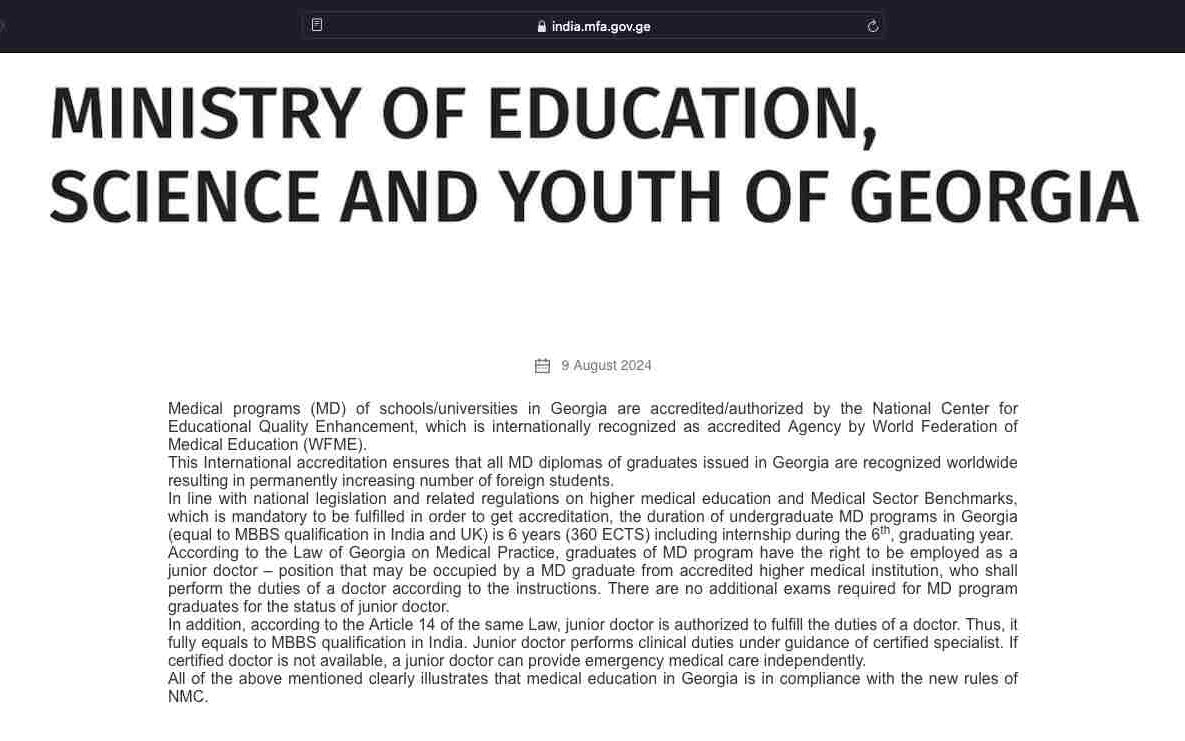
What You Should Know About FMGL Regulations
In this article, we will delve into the question, “Is the Georgia MBBS degree valid in India?” Alternatively, this can also be framed as whether the medical universities in Georgia comply with the FMGL Regulations. Let’s explore the answer.
First, it’s important to understand that the rules and regulations for Indian students studying abroad were significantly different before November 18, 2021.
Before 18th November 2021, there was a list of MCI-recognized universities. This meant that as long as Indian students cleared NEET before admission and graduated from an MCI-recognized university, they were eligible to sit for the licensing exam in India. Those Indian students who got admission before November 2021 were governed by the old rules. The process was straightforward, and the rules were easy to understand. However, all of this changed in November 2021.
On November 18, 2021, the National Medical Commission (NMC) introduced the Foreign Medical Graduate Licentiate (FMGL) Regulations. These regulations significantly changed the guidelines governing Indian students pursuing MBBS abroad. According to these rules, students must adhere to specific criteria, and failure to meet any of these regulations renders the degree invalid in India, making the student ineligible for the FMGE/NExT (India’s licensing exam).
The FMGL Regulations mandate the following:
- Minimum Course Duration: The course must span at least 54 months (4.5 years).
- Internship Abroad: A one-year internship must be completed in the country of study.
- Internship in India: An additional one-year internship must be completed in India.
- Medium of Instruction: The medium of instruction must be English.
- Syllabus: The syllabus of the medical course must align with that of India.
- Internship Standards: The internship must be equivalent to the one conducted in India.
- Practice License: The student must obtain registration or a license to practice in the country where they completed their medical education.
- Same Institution: The entire course, including training and internships, must be completed at the same university.
- Completion Timeline: The medical course must be completed within ten years from the date of admission.
Only after fulfilling all these requirements can a student appear for the NExT exam in India. As per NMC, if the university or country does not meet these regulations, the medical degree will not be valid in India.
Is There a List of NMC-Recognized Universities?
Given the extensive changes in regulations, one might expect a new list of NMC-recognized or approved universities. However, the NMC has taken the opposite approach. As of January 2025, the NMC has not published a list of universities or countries that comply with these regulations. They are not expected to do so. This has led to confusion and concern among Indian students and their families.
The NMC explicitly states on its website that it does not maintain a list of approved medical universities abroad.
Despite this, some admission agents in India falsely claim that the universities they promote are NMC-approved. Such claims are misleading and constitute deceptive marketing aimed at increasing their profits.
How Can Students or Parents Confirm Compliance with FMGL Regulations?
Since the NMC does not maintain a list of approved universities and has not endorsed any country, selecting a compliant institution has become a significant challenge for parents and students. The NMC is not expected to release a list of approved universities. Indian students may have to wait until 2027 or 2028, when the first batch of students under the new rules graduates, to definitively determine which countries comply with FMGL Regulations.
Students and parents must exercise due diligence by thoroughly researching universities, consulting reliable sources, and seeking expert guidance to ensure the chosen institution meets all FMGL Regulations. Here are a few of the sources to gather information on which countries fulfil FMGL Regulations:
- Ministry of Education of the country
- Universities
- Indian Embassy in that country
You should try to gather information from the above sources and feel satisfied that the country you are choosing fulfils FMGL Regulations.
So, Is Georgia MBBS Valid in India?
Now, it is clear that the NMC has not approved the medical degree awarded by any country. There is no list of NMC-approved universities, nor is the NMC expected to provide any clarification. Furthermore, we may have to wait until 2027 or 2028 to determine which countries comply with FMGL Regulations, as that is when the first batch of students under the new rules will graduate and return to India to apply for the NExT exam. However, waiting that long is not a viable option, is it?
For students who wish to study MBBS in Georgia and wish to know if Georgia MBBS is valid in India can try to find their answer by looking into the notification released by the Ministry of Education of Georgia.
The Ministry of Education, Science and Youth gave its verdict on whether the degree awarded by the medical universities in Georgia is valid in India or not. Here is a screenshot of what they had to tell:
To summarise, here is what the Ministry of Education, Science and Youth of Georgia said:
- the total MBBS in Georgia course duration is 6 years
- internship will be done in the 6th year
- graduates have a right to be employed as junior doctors without any additional exam
The response also mentions that as per the Ministry of Education of Georgia, the Georgia MBBS Degree is valid in India.
Global Medical Foundation’s Shobhit Jayaswal has met with the officials of many universities and he mentions that the universities maintains that the medical degree of Georgia fulfils FMGL Regulations. Here are a few videos of the same:
Global Medical Foundation would recommend to students and their parents that they check all information and satisfy themselves regarding how a country fulfils FMGL Regulations before they apply for admission.

